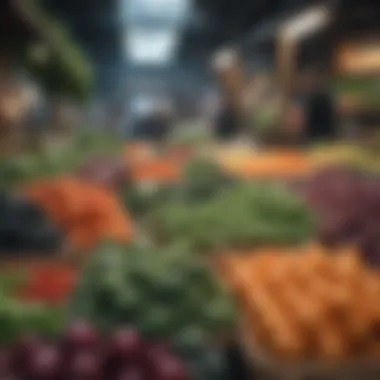Understanding Small Scale Farming: A Comprehensive Exploration


Intro
Small scale farming serves as a major component of agricultural systems worldwide. This type of farming is defined by its limited size and scope, contrasting with large agribusiness operations. Understanding its dynamics provides essential insights into economic viability, environmental sustainability, and food security.
Historical Context
Historically, small scale farming dates back to ancient times. Communities relied on nearby soil and water sources. Over generations, various farming practices evolved, adapting to cultural and environmental changes. This evolution has continued, shaping how small farmers operate today.
Current Practices
Today, small scale farming varies significantly depending on regional practices and crops. Families often engage in growing diverse crops, which can include vegetables, fruits, and grains. Some farmers also raise animals for meat, milk, or eggs. This diversity helps reduce risks associated with market fluctuations and climate variability.
Economic Importance
In many areas, small scale farmers contribute significantly to local economies. They generate employment, foster local food markets, and support sustainable practices. Furthermore, small scale farms often utilize traditional knowledge and methods, which may contribute to improved resilience against changing environmental conditions.
Environmental Impact
Small scale farming generally has a lower environmental footprint compared to industrial agriculture. Practices such as crop rotation and organic farming promote soil health and biodiversity. However, challenges like land degradation and climate change can threaten these benefits. Addressing these issues is essential for maintaining sustainable practices.
Food Security
Small scale farmers play a crucial role in ensuring food security globally. They produce a significant percentage of the world's food, particularly in developing countries. By focusing on local needs, these farmers help to stabilize food systems against global market disruptions.
Through this comprehensive exploration, the aim is to clarify the intricate relationship between small scale farming and today’s socio-economic landscape. Understanding this relationship is crucial for students, researchers, educators, and professionals interested in sustainable agricultural practices.
Intro to Small Scale Farming
Small scale farming plays a crucial role in the agricultural sector, standing out as an essential part of food production systems. It serves as a foundation for rural economies and helps sustain community livelihoods. By understanding the elements and characteristics of small scale farming, one gains insights into its benefits and challenges, which contribute to broader economic, environmental, and social frameworks.
From enhancing local food security to promoting biodiversity, small scale farming encourages diversified agricultural practices. These farms not only provide food for local communities but also create jobs, support small businesses, and stimulate local economies. As we explore this topic, it is important to consider the inherent values and practices that define small scale farmers.
Definition and Characteristics
Small scale farming refers to agricultural operations that typically occupy limited land area and use less complex technologies compared to large-scale commercial farms. These farms often rely on family labor and traditional methods that emphasize sustainability. The characteristics of small scale farming include a focus on subsistence production, crop diversity, and sustainable resource management.
Different regions around the world may define small scale farming variably, influenced by local practices and cultural definitions. Nevertheless, the common thread is their contribution to community resilience in the face of changing agricultural landscapes.
Historical Development
The historical context of small scale farming can be traced back to ancient agricultural practices where communities cultivated land to sustain themselves. These methods evolved over centuries, influenced by climatic changes, societal transformations, and technological advancements. In the early 20th century, small scale farming faced challenges from industrial agriculture, which dominated the agricultural sector. However, its importance has gained recognition once again as societies emphasize sustainability and food sovereignty.
Over time, various movements, such as organic farming and agroecology, have reaffirmed the value of small scale farming. Today, small farms keep their relevance by preserving traditional knowledge, maintaining local ecosystems, and adapting practices to contemporary needs. This historical perspective highlights the capacity of small scale farming to adapt while remaining integral to local communities.
Economic Implications
The topic of economic implications is essential for understanding small scale farming. It extends beyond mere agricultural practice; it roots deeply in local economies, market dynamics, and financial systems. Small scale farming often acts as a backbone for the economies in rural areas. It provides employment, stimulates trade, and encourages local entrepreneurship. The interplay between these aspects can significantly affect food security and economic independence.
Role in Local Economies
Small scale farming plays a significant role in local economies. It can provide stable sources of employment, particularly in regions where larger agricultural operations may not exist. These farms often employ family members and local workers, fostering community ties and reducing unemployment rates. Furthermore, they contribute to local markets by supplying fresh produce, which can increase the availability of healthy food options.
"Small scale farmers are essential for economic diversity and resilience in local communities."
Additionally, small scale farmers often reinvest their earnings back into their communities. This might encompass local purchasing of supplies, hiring local services, and supporting local initiatives. The result is a multiplier effect that can enhance economic growth in rural areas.
Market Access and Value Chains
Access to markets is a critical factor for small scale farmers. They often face barriers that limit their ability to sell products competitively. It can be challenging to connect with larger distribution channels or to establish a brand presence. However, local farmers' markets and community-supported agriculture (CSA) initiatives have emerged as valuable avenues. These pathways enable small scale farmers to sell directly to consumers, often ensuring better price stability than traditional market routes.


Establishing efficient value chains is also vital. This process involves not only producing food but also considering the stages from production to consumption. Having a clear understanding of this chain allows farmers to identify areas for improvement. For instance, reducing waste in logistics and enhancing product quality can lead to increased profitability.
Financing and Investment Challenges
Financing represents one of the most formidable challenges for small scale farmers. Access to credit can be limited, primarily due to lack of collateral, high interest rates, and bureaucratic hurdles. Many small scale farmers rely on personal savings or assistance from family and friends rather than institutional support. As a consequence, their ability to invest in necessary tools and technology can be hampered.
Investment in farming technology is essential for improving productivity. However, the initial costs can be prohibitive. Programs that offer microloans or grants geared toward small scale farmers can be a game changer.
In summary, understanding the economic implications of small scale farming is vital. The benefits extend from individual farmers to entire communities, reinforcing the importance of local food systems in today’s economy.
Environmental Sustainability
Environmental sustainability is a critical focus in the context of small scale farming. As the world grapples with climate change, deforestation, and biodiversity loss, sustainable practices within agriculture are essential to mitigate these challenges. Small scale farmers often operate with fewer resources, making efficient techniques and sustainable methods even more relevant. Emphasizing ecological balance, these farmers contribute to preserving natural resources while maintaining agricultural productivity.
Biodiversity and Ecosystem Health
Biodiversity plays a key role in ecosystem health. Small scale farming often promotes diverse crops and livestock, which support wider ecological stability. By cultivating a variety of plants, farmers can reduce pest outbreaks and improve soil quality. This diversity fosters resilience against disease and climate variability.
Diverse ecosystems tend to support a range of species, which can enhance pollination and improve crop yields. The integration of native plants can also revive local wildlife habitats.
Key Benefits of Biodiversity in Small Scale Farming:
- Reduces dependency on chemical pesticides
- Enhances soil fertility
- Supports sustainable pest management
- Increases local food security
Soil Management Practices
Soil is a fundamental component of successful small scale farming. Healthy soil contributes not only to crop productivity but also to overall environmental health. Effective soil management practices can reduce erosion, enhance nutrient content, and promote biological activity.
Small scale farmers often engage in organic practices. These include crop rotation, cover cropping, and composting. Each of these methods enriches the soil structure and fertility, leading to increased yields over time. Implementing practices that prioritize soil health is vital for sustainable agriculture.
Considerations for Soil Management:
- Assessment of soil health regularly
- Integration of organic materials
- Minimization of chemical inputs
Water Resource Management
Water management is another pivotal element for small scale farmers. Proper use and conservation of water resources is vital, especially in regions facing drought or water scarcity. Sustainable water management strategies enhance agricultural resilience and promote ecosystem sustainability.
Techniques such as rainwater harvesting, drip irrigation, and mulching can significantly improve water efficiency. Additionally, understanding the local watershed is crucial for managing water use effectively.
"Sustainable water management not only increases farm productivity but also conserves vital water resources for future generations."
Principles of Effective Water Resource Management in Farming:
- Monitor water usage and soil moisture levels
- Employ water-efficient irrigation techniques
- Establish proper drainage to avoid runoff
Technological Innovations
Technological innovations play a crucial role in the evolution and efficiency of small scale farming. In today’s agricultural landscape, these advancements directly address challenges faced by small farmers, promoting sustainable practices while enhancing productivity. As the world increasingly focuses on food security, it is vital to explore how technology can support farmers in optimizing their methods. This section highlights three key technological innovations that are reshaping small scale farming: precision agriculture tools, sustainable farming equipment, and digital platforms for small farmers.
Precision Agriculture Tools
Precision agriculture tools are designed to optimize field-level management. These tools allow farmers to use data analytics to make informed decisions regarding planting, irrigation, and fertilization. For instance, tools like GPS systems and soil moisture sensors help assess the condition of crops and soil accurately. This leads to better resource management, reducing waste and improving yields. Moreover, by utilizing these tools, farmers can respond to changes in plant health more swiftly, enhancing the overall resilience of their operations.
The benefits of precision agriculture include:
- Enhanced Efficiency: Farmers can apply water, fertilizers, and pesticides more judiciously, which lowers expenses and minimizes environmental impact.
- Higher Productivity: With accurate data, farmers can maximize output from their fields.
- Better Crop Management: Identifying problems early can lead to timely interventions.
While precision agriculture offers numerous advantages, it also demands a level of investment and knowledge that may be a barrier for some small scale farmers. Consequently, training and financial support are essential to maximize the benefits of such innovations.
Sustainable Farming Equipment


Sustainable farming equipment embodies the shift toward environmentally friendly practices in agriculture. Innovations such as solar-powered tools, eco-friendly tractors, and no-till drills are designed to minimize harm to the soil and ecosystem. These equipment options are not only energy-efficient but also help to reduce the carbon footprint of farming activities.
Some benefits of using sustainable equipment include:
- Reduced Environmental Impact: The use of less harmful fuels and methods conserves natural resources.
- Cost Savings: While upfront costs may be higher, fuel savings and long-lasting durability can lead to lower overall expenses.
- Soil Health Improvement: Practices like no-till farming maintain soil structure better, promoting healthier crops.
However, the transition to sustainable farming equipment can be complex. Farmers need access to financial resources and education about the benefits of investing in such tools.
Digital Platforms for Small Farmers
Digital platforms have emerged as a transformative force for small scale farmers. These platforms offer a marketplace for connecting farmers with consumers, suppliers, and resources. Applications such as Farmigo and LocalHarvest facilitate direct sales to consumers, which can significantly increase farmers’ profit margins.
Advantages of these digital platforms include:
- Broadened Access to Markets: Farmers can reach a larger audience without relying solely on middlemen.
- Resource Management: These platforms often provide tools for tracking inventory and sales, simplifying business operations.
- Networking Opportunities: By connecting with other farmers and industry experts, users can share best practices and gain valuable insights.
However, digital literacy and internet access remain obstacles for some small scale farmers. Bridging this gap is critical to harnessing the full potential of these innovations.
Integrating technological innovations is not simply an option; it is essential for the sustainability and future of small scale farming.
Social Dimensions
The social dimensions of small scale farming are critical in understanding its overall impact on communities and rural economies. These aspects encompass not only the relationships within farming families and communities but also the broader cultural implications of small scale farming practices. Community engagement and cultural connections play a significant role in the sustainability and success of these farms. Furthermore, they help shape the identity and resilience of the rural landscape.
Community and Family Farms
Community and family farms often represent the backbone of rural societies. These farms foster a sense of belonging and shared purpose among members. The interdependence of community farmers creates networks that encourage knowledge exchange and promote cooperative practices.
Family farms, by their nature, emphasize values such as hard work, tradition, and stewardship of the land. They often serve as educational environments where younger generations learn not just farming skills but also important life lessons. The commitment of family farmers contributes to the preservation of local agricultural practices and biodiversity.
Moreover, community farms can enhance local food systems. By providing fresh produce to local markets, they reduce transportation costs and carbon footprints while strengthening food security.
"Community-supported agriculture initiatives are prime examples of how small scale farms can directly connect producers and consumers, fostering strong local ties."
Cultural Significance of Small Scale Farming
Small scale farming carries rich cultural significance that extends beyond mere economic factors. Farms often reflect local traditions, cuisines, and lifestyles, playing a key role in preserving heritage. Each region has specific crops and farming techniques that cater to its unique climate and cultural practices.
These farms contribute to culinary diversity and promote localized food sourcing. By emphasizing traditional methods, small scale farms can help sustain regional identities and enhance cultural pride. Additionally, farming festivals and community events centered around harvesting promote communal bonding and celebrate agricultural heritage.
Impact on Rural Development
Small scale farming has a profound impact on rural development, influencing economic stability and social cohesion. These farms create jobs and encourage local entrepreneurship, helping to sustain rural populations. By providing employment, small scale farms can reduce migration to urban areas, enabling communities to maintain demographic balance.
Moreover, invested farmers often engage in community initiatives, leading to improvements in local infrastructure and services. They may support educational programs or contribute to health services, fostering holistic Community development.
In summary, the social dimensions of small scale farming extend beyond individual farms. They enrich communities culturally and socially while also contributing to the sustainability of rural economies. Understanding these relationships underlines the significance of supporting small scale farming in today’s development discourse.
Challenges Facing Small Scale Farmers
Small scale farmers face various challenges that can undermine their potential in contributing to sustainable agriculture and local economies. Understanding these challenges is critical for developing solutions that not only enhance productivity but also ensure the viability of their livelihoods. Small scale farmers often operate under tight constraints, balancing environmental, social, and economic demands. Addressing these difficulties is paramount to fostering an agricultural landscape that can withstand modern pressures.
Climate Vulnerability
Climate vulnerability stands as a principal challenge for small scale farmers. These farmers often lack the adaptive capacity to manage risks associated with changing weather patterns, such as droughts, floods, or unseasonable frost. Such extreme conditions can devastate crops, leading to reduced yields and, subsequently, lower income. The consequences of climate change are most acutely felt by those who rely on agriculture for their livelihood. Many small farmers lack access to necessary resources like weather forecasting and advanced technology to prepare for and mitigate these risks.
According to studies, over 80% of rural poor depend on agriculture for their survival. Additionally, smallholder farms typically have fewer financial reserves, making it difficult for them to recover from a bad season. This cycle of vulnerability can lead to increased food insecurity not only for farmers' families but also for the communities they serve.
Market Volatility and Trade Barriers
Market volatility affects small scale farmers as they often lack market power to influence prices. Prices for agricultural products can fluctuate dramatically due to several factors including global market trends, consumer demand shifts, and trade policies. Small farmers are usually price takers rather than price makers, which means they have little control over the revenue they can earn from their produce.


Trade barriers can further complicate access to markets. Issues such as tariffs, quotas, and complex regulations can hinder small scale farmers from reaching broader markets. Many farmers may find it costly to navigate these challenges, limiting their ability to sell their goods beyond local boundaries. When farmers cannot access profitable markets, they face the risk of unsold produce, leading to financial strain.
Access to Resources and Support
Access to resources is integral for small scale farmers to thrive. However, many of these farmers find it difficult to secure financing, quality seeds, and necessary tools. Limited access to credit can prevent them from investing in technology or improving techniques that could enhance productivity. Financial institutions may view small scale farming as too risky or unprofitable, leaving farmers without essential support.
Furthermore, information and educational resources are often lacking in rural areas. Without training programs that teach best practices in farming techniques, sustainable practices, or business management, small scale farmers may struggle to keep pace with advancements in agriculture. Thus, government support, NGOs, and community organizations play vital roles in bridging this gap.
Effective resource allocation and direct support can significantly bolster small scale farmers' productivity and stability.
In summary, addressing the challenges facing small scale farmers is essential for not just their own success but also for food security and the health of local economies. Recognizing and understanding these difficulties is the first step in creating robust solutions that can empower this critical sector of agriculture.
Global Perspectives
Understanding small scale farming requires a comprehensive view that spans across borders and cultures. These global perspectives provide invaluable insights into how local practices, economies, and policies intersect and evolve. This section will delve into the multifaceted implications of small scale farming on a global level. By examining case studies, international policy frameworks, and global trends, we uncover the common challenges and solutions that resonate across different regions.
Case Studies from Various Regions
Case studies serve as a focal point for understanding the real-life implications of small scale farming across different regions. For instance, the experience of small scale farmers in India often reveals the intense pressure from urban migration and market fluctuations. In Kerala, a cooperative model showcases how small farmers collectively manage resources to enhance productivity and market access. On the other hand, in Sub-Saharan Africa, small holder farmers face climate vulnerability which limits their ability to adapt to changing conditions.
Key examples include:
- India: The rise of organic farming in Madhya Pradesh highlights shifts towards sustainable practices, yet challenges with government policy persist.
- Brazil: The movements for land rights have emphasized how small farmers fight against larger agribusiness entities to secure their livelihoods.
- Africa: Case studies indicate the need for improved access to financing, which could empower small farmers to invest in resilient farming methods.
These examples underline the diverse challenges and potential strategies that small scale farms encounter in various contexts.
International Policy Frameworks
International policy frameworks shape the landscape for small scale farmers globally. Organizations such as the Food and Agriculture Organization (FAO) and the International Fund for Agricultural Development (IFAD) play pivotal roles in framing policies that affect small scale agriculture. These frameworks not only address immediate economic and social issues but also consider long-term sustainability and food security.
Additionally, trade agreements impact local farming by dictating market access and competition. A critical examination of policies like the CAP (Common Agricultural Policy) in Europe and the various trade regulations under the WTO (World Trade Organization) illustrates ongoing tensions between local and global agricultural practices. These frameworks often require reevaluation to better support small scale farmers who remain integral to local economies.
Global Trends Affecting Small Scale Farming
As we look into the future, several global trends significantly affect small scale farming. The increasing importance of sustainable practices leads to greater emphasis on agroecology, which harmonizes farming with natural ecosystems. Environmental changes also play a crucial role, with climate change posing severe threats to agricultural viability worldwide.
Another trend is the rise of digital agriculture, where small farms begin to leverage technology for better productivity and market access. Many small-scale farmers embrace mobile apps for weather forecasts or market prices, bridging knowledge gaps.
Lastly, the ongoing discussion surrounding food sovereignty emphasizes the right of peoples to healthy and culturally appropriate food produced through ecologically sound and sustainable methods. This principle encourages local control over food systems and reaffirms the value of small scale farming.
The future of food security hinges on the recognition of the vital role that small scale farmers play in nurturing sustainable practices within their communities.
In summary, a global perspective on small scale farming reveals a rich tapestry of interconnected experiences. These insights not only enrich understanding but also inform approaches to addressing the myriad challenges faced by farmers worldwide.
Future Outlook
The future outlook for small scale farming is a topic of increasing importance as the world grapples with issues like climate change, food security, and sustainable development. Understanding the trends and innovations on the horizon is vital for small scale farmers, policy-makers, and stakeholders in the agricultural sector. This section will examine three critical areas: innovative practices, policy recommendations, and engagement and education strategies.
Innovative Practices and Resilience
Small scale farmers are known for their adaptability. With the constant changes in environmental conditions and market demands, innovative practices are essential for resilience. Techniques such as crop rotation, intercropping, and agroforestry not only enhance biodiversity but also improve soil health and increase crop yields. These techniques can mitigate the impact of climatic variability.
Moreover, integrating technology plays a crucial role in modernization. For instance, precision agriculture tools enable farmers to make data-driven decisions. These tools might include soil sensors that measure moisture or drones that survey crop health. Farmers who invest in these technologies often find they can manage their resources more efficiently, leading to sustainable production.
Policy Recommendations
Policy interventions are essential to support small scale farmers in their quest for sustainability. Governments should focus on creating a favorable environment that encourages agricultural innovation. This can include providing access to financial resources, subsidizing sustainable practices, and improving infrastructure. Furthermore, policies that support agricultural cooperatives can empower small farmers to leverage collective bargaining.
By improving access to quality seeds and training on modern farming practices, the government can help farmers achieve better yields. Additionally, setting up systems for fair market access is crucial. It can prevent exploitation by middlemen and ensure farmers receive a fair price for their produce.
Engagement and Education Strategies
Educating small scale farmers is pivotal for improving their skills and knowledge about innovative practices. Agricultural extension services should be enhanced to offer training and resources that meet specific local needs. Engagement strategies can include workshops, demonstration plots, and community farming clubs where farmers can share knowledge and experiences.
Moreover, digital platforms can serve as effective tools for education and networking. Farmers can access online resources, learn about best practices, and engage in virtual discussions with experts. These platforms can also facilitate collaboration among small farmers, allowing them to create supportive networks.
Investing in education and innovation is the key to a sustainable future for small scale farming. It can lead to enhanced productivity, environmental stewardship, and economic resilience.



